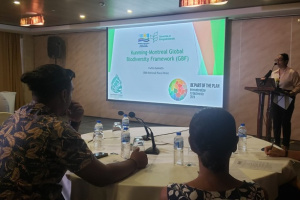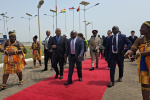Talks start in Seychelles on first GEF-financed Blue Economy project in Indian Ocean

Minister Joubert said that as the significant journey starts, the foremost commitment lies in preserving Seychelles' globally significant biodiversity. (Gerard Larose)
(Seychelles News Agency) - Discussions have started in Seychelles to address gaps and regulatory systems for the first GEF-financed Blue Economy project to be implemented in the Indian Ocean.
An inception workshop on the project entitled "Prioritising Biodiversity Conservation and Nature-based Solutions as Pillars of Seychelles' Blue Economy" took place on Wednesday.
The project is being funded by the Global Environment Fund (GEF) and is expected to lay the groundwork for a more resilient Seychelles.
Its scope and strategy are based on the outcomes of a National Portfolio Formulation Exercise (NPFE) carried out during the end of 2018 - early 2019 to establish priorities for funding from GEF-7.
The project is also consistent with and contributes to the implementation of a number of national policies, strategies, and plans in Seychelles such as the Marine Spatial Planning (MSP) initiative, Seychelles Blue Economy Strategic Policy Framework and Roadmap (2018-2030), and the National Development Strategy (NDS) 2019-2023.
Participants at the workshop were from various environmental organisations, both from the government and non-government.
When presenting her project, the project's manager, Victoria Alis, explained that they were invited "as the project covers a plethora of areas from ensuring that will need many different sectors to be on board."
In his address at the opening of the workshop, the Seychelles' Minister for Agriculture, Climate Change and Environment, Flavien Joubert, said, "Today, we stand at a crucial juncture, where the protection of our invaluable biodiversity and the sustainable development of Seychelles' Blue Economy are intricately intertwined in our shared pursuit of a resilient and thriving future."
The latest project is consistent with and contributes to the implementation of a number of national policies, strategies, plans and reports.
"As we embark on this significant journey, our foremost commitment lies in the preservation of Seychelles' globally significant biodiversity. Implementing the Marine Spatial Plan will be highly useful and replicable beyond the Seychelles, as many other small island countries face similar human resource, natural resource and financial challenges for which they are seeking new solutions," said the minister.
Joubert added that "these areas, brimming with diverse marine life and delicate ecosystems, demand our utmost attention and unwavering dedication. We must strengthen our resolve to enact robust and comprehensive conservation strategies that safeguard the rich tapestry of life within these pristine waters."
Another component of the project will deal with capacity building after looking at institutions responsible for oceans' financial capacity and developing a five-year strategic plan.
The project is scheduled to end in June 2029.





